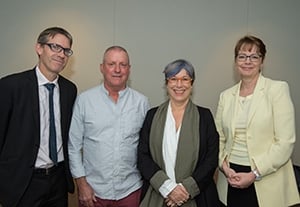Safeguarding people with disabilities
Research news
Several recent major enquiries, including a senate inquiry and a Victorian Ombudsman’s report, have revealed the extent of violence and abuse of people with disability, in particular the high rates of violence, abuse and neglect in services.
According to a leading UK expert on learning disability, Dr Paul Cambridge, if we are to address these problems, Australia needs to: strengthen local accountability (by involving local communities, professionals and relatives); decrease reliance on “bureaucratically driven, defensive, rules-based approaches to …. safeguarding adults;” and invest in emotional intelligence.
Dr Cambridge was keynote speaker at the “Safeguarding research, policy and practice for people with disability” forum, which was co-hosted by Deakin’s Disability and Inclusion team in the School of Health and Social Development, and the Victorian Office of the Public Advocate.
The forum was held at Deakin’s Waterfront campus on October 23 and attended by researchers, disability advocates and policy makers.
Forum organiser, Dr Patsie Frawley, a Senior Research Fellow from Deakin’s School of Health and Social Development, said that Australia could learn much from the UK’s recent reforms, and Deakin has taken a leading role in working towards innovative and contemporary approaches to the understanding of, and responses to disability.
“An important aim of the forum was to bring key players together to progress the disability services reform agenda in areas relating to policy, practice, research and education,” Dr Frawley said.
Overviews of current policy and practice were provided by the Office of the Public Advocate, the Disability Services Commissioner, the National Disability Insurance Agency, the Department of Health and Human Services, National Disability Services, St Laurence, and the Office of the Senior Practitioner.
“We need to strengthen our strategies so that we can change from the ‘closed’ culture of disability services, to a situation where the community is more in touch with what’s happening in the lives of those with disabilities,” said Dr Frawley.
“Our research has shown that we need to improve support for individuals and instigate major changes at the systemic level - by improving training for leaders and staff, improving response approaches to violence and abuse, and developing better prevention strategies that include people with disabilities.”
Dr Frawley coordinates a peer-led program on respectful relationships for people with disabilities, “Living Safer Sexual Lives: Respectful Relationships.”
“We also need to hold to account people who perpetrate or sanction violence, abuse and neglect of people with disabilities,” she added.
“This requires a rights-based approach to reporting and responding, legal reform, funding reform and a zero-tolerance approach.”
With funding from the Australian National Research Organisation on Women's Safety, Dr Frawley is currently leading a national research program to identify accessible, inclusive and effective response service models for women and girls with disabilities.
The program aims to develop national guidelines that will lead to improved practices in violence and abuse response services, such as refuges, domestic violence and sexual assault services.
Deakin has developed a unique, on-line Graduate Certificate of Disability and Inclusion that will be available from 2016 to people with a degree in any field or a Certificate 1V in Disability. This course will develop critical and informed professionals in areas including disability and inclusion policy and practice.
A number of short courses will also be developed with industry, to reflect the needs of the National Disability Insurance Agency and other key disability sector organisations.
- For information about courses in Disability and Inclusion, research and short courses, contact Dr Patsie Frawley.
- Read more in “The Conversation:” Abuse and neglect of people with disabilities demands zero-tolerance response.
Share this story
 At the Safeguarding Forum: Dr John Chesterman, Office of the Public Advocate; Dr Paul Cambridge, UK; Professor Susan Balandin, Deakin's Chair in Disability and Inclusion; and Alex Gunning, Director, Provider Support, National Disability Insurance Agency.
At the Safeguarding Forum: Dr John Chesterman, Office of the Public Advocate; Dr Paul Cambridge, UK; Professor Susan Balandin, Deakin's Chair in Disability and Inclusion; and Alex Gunning, Director, Provider Support, National Disability Insurance Agency.
